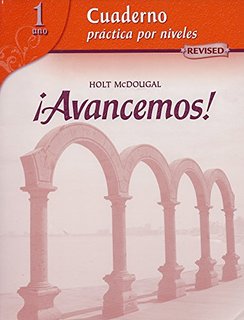
All Solutions
Page 352: Gramatica C
**estar (to be) + present participle = present progressive**
Here is some useful information to help you master the **present participle**:
– ***-ar*** verbs have the ending ***-ando*** (e.g. camin*ando*)
– ***-er*** and ***-ir*** verbs have the ending ***- iendo*** (e.g. com*iendo*)
|Singular |Plural |
|–|–|
|Yo **estoy** |Nosotros **estamos** |
|Tú **estás** |Ustedes **están** |
|Él/Ella/Usted **está** | Ellos/Ellas **están**|
*(Marcos and I are arriving at our houses.)*
*Marcos and I (we)* is first-person plural, so we used the first-person plural form of *estar,* which is *”estamos.”*
*Liegar (to arrive)* ends with *-ar*, so we added *-ando* ending.
*(Marcos is washing his clothes with soap.)*
*Marcos (he)* is third-person singular, so we used the third-person singular form of *estar,* which is *”está.”*
*Lavar (to wash)* ends with *-ar*, so we added *-ando* ending.
*(I am burning vacation photos on a compact disc.)*
(I am copying vacation photos to a compact disc.)*
*Yo (I)* is first-person singular, so we used the first-person singular form of *estar,* which is *”estoy.”*
*Quemar (to burn/to copy)* ends with *-ar*, so we added *-ando* ending.
*(Marcos and Mariela are reading their e-mails.)*
*Marcos and Mariela (they)* is third-person plural, so we used the third-person plural form of *estar,* which is *”están.”*
*Leer (to read)* ends with *-er*, so we added *-iendo* ending. The stem also changed from *i* to *y*.
*(You are bathing before you sleep.)*
*Tú (you*) is second-person singular, so we used the second-person singular form of *estar,* which is *”estás.”*
Note that *bañar**se*** is a reflexive verb, so we used a pronoun appropriate for the second-person singular, which is *”**te.”***
*Bañar (to bathe)* ends with *-ar*, so we added *-ando* ending.
1. estamos llegando
2. está lavando
3. estoy quemando
4. están leyendo
5. te estás bañando
You should write sentences about people who just came back from a trip. Use the sentences below as a reference.
*(Marcos and Natalia are taking out clothes from their suitcases.)*
*Marcos and Natalia (they)* is third-person plural, so we used the third-person plural form of *estar,* which is *”están.”*
*Sacar (to take out)* ends with *-ar*, so we added *-ando* ending.
*(Natalia is sleeping because she is tired.)*
*Natalia (she)* is third-person singular, so we used the third-person singular form of *estar,* which is *”está.”*
*Dormir (to sleep)* ends with *-ir*, so we added *-iendo* ending. The stem also changed from *o* to *u*.
*(Natalia and I are talking about the trip.)*
*Natalia and I (we)* is first-person plural, so we used the first-person plural form of *estar,* which is *”estamos.”*
*Hablar (to talk)* ends with *-ar*, so we added *-ando* ending.
*(I am sending photos to my parents by e-mail.)*
*Yo (I)* is first-person singular, so we used the first-person singular form of *estar,* which is *”estoy.”*
*Mandar (to send)* ends with *-ar*, so we added *-ando* ending.
*(You are resting.)*
*Ustedes (you)* is second-person plural, which is conjugated the same as the third-person plural, so we used the third-person plural form of *estar,* which is *”están.”*
Note that *descansar**se*** is a reflexive verb, so we used a pronoun appropriate for the third-person plural, which is ***”se.”***
*Descansar (to rest)* ends with *-ar*, so we added *-ando* ending.
You should write three sentences about what your family members are doing now. Use the sentences below as a reference.
*(My parents are working.)*
*My parents (they)* is third-person plural, so we used the third-person plural form of *estar,* which is *”están.”*
*Trabajaar (to work)* ends with *-ar*, so we added *-ando* ending.
*(My sister is doing her make-up to go out.)*
*My sister (she)* is third-person singular, so we used the third-person singular form of *estar,* which is *”está.”*
Note that *maquillar**se*** is a reflexive verb, so we used a pronoun appropriate for the third-person singular, which is ***”se.”***
*Maquillar (to do make-up)* ends with *-ar*, so we added *-ando* ending.
*(My brother is playing video games.)*
*My brother (he)* is third-person singular, so we used the third-person singular form of *estar,* which is *”está.”*
*Jugar (to play)* ends with *-ar*, so we added *-ando* ending.

